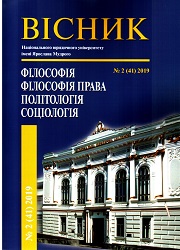С. ЖИЖЕК О БЕССОЗНАТЕЛЬНЫХ ПРЕДПОСЫЛКАХ ИДЕОЛОГИИ
S. ZIZEK ABOUT UNCOUSCIOUS PRECONDITIONS OF IDEOLOGY
Author(s): Boris Dmitrievich Golovanov, Olga Volodymyrivna FrolovaSubject(s): Structuralism and Post-Structuralism, Political behavior, Politics and society, History and theory of political science, Psychoanalysis, History and theory of sociology, Social Theory, Sociology of Politics, Politics of History/Memory
Published by: Національний юридичний університет імені Ярослава Мудрого
Keywords: ideology; real abstraction; protophantasy; real and symbolic:
Summary/Abstract: Problem setting: The meaning of ideology in modern society does not need any validation, but the question of its forming remains extremely relevant. XXI century realia pushes to find new interpretations in traditional approaches. Views of S. Zizek unconscious preconditions of ideology are worthy of special analysis.Recent achievents and publications analisys. The problem of correlation between conscious and unconscious in symbolic activity has been repeatedly brought up in the works of authors who chose postmodernism as a methodological paradigm in their research. Many of them had continually undertook attempts to deconstruct the ideology phenomenon. The originality of S. Zizek research is in the use of Lacan’s version of psychoanalysis as an instrument for his research.Paper objective. Main objective of the following paper is to uncover the possibilities of uncounscious in phenomenon of ideology realization.Paper main body. In the following paper the establishing and functioning of ideology in the perspective critical to Marxism ideology is examined. The use of psychoanalytical approach as a methodological guide becomes extremely popular in many fields of knowledge. The works of S. Zizek make readers see the problem of ideology from different viewpoint, constructively criticize the established approaches, and detect heuristic possibilities of psychoanalysis use in this field.As opposed to methodological orientation of postmodernism, Zizek in his analysis ensures consistency with Marxism and German classical philosophy; he even states the necessity to rehabilitate Hegel and his dialectics. He believes that psychoanalytical interpretation of ideology reestablishes the concept of thinking to be a real process, without concentration on the world of subjective individual. He sees Marxism as a teaching to study and explains fetishistic forms of consciousness, categorizing ideology as its intellectual variation. Ideology is something bigger than a false reflection of reality. In the case of ideology, reality distortion is possible only because human individuals in their practical work unconsciously create and cultivate this kind of distortion. The mere existence of social reality is based on the fact, that individuals to reproduce this reality are not fully aware of the content and consequences of their actions.Psychoanalytical interpretation of ideology studies social practices and socially sustained beliefs as something derivative from subjective inner appetence of an individual. The most important objective of psychoanalytical criticism of ideology is to bring the ideological consciousness to the point where it can distinguish distorted products of projective activity in its own life. Psychoanalytical criticism of ideology should answer the question of what the symbolic order should be. It should be social reality constituting to save body and spirit health of individuals creating this reality.Conclusions of the research. The psychoanalytic interpretation of the phenomenon of ideology reveals that the connection between the values postulated by a particular ideology and the scientific argumentation used to substantiate these values is purely formal and optional. Scientific constructions, which are used by ideology, only «hide the excess pleasure inherent in any ideological form». The ideological construction is intended to hide behind rational arguments a thought that is destructive for the entire social system, that the goal of ideology is ideology itself, that the purpose of authority is authority itself. All rationalizations are only a by-product of the ideology’s desire for self-sufficiency. The conclusion is absolutely obvious: it is senseless to approach the analysis of any ideology from the side of its content. There will always be a gap between the declared values and the nature of the ideological form, which cannot be overcome by any rational analysis.
Journal: Вісник НЮУ імені Ярослава Мудрого. Серія: Філософія, філософія права, політологія, соціологія
- Issue Year: 41/2019
- Issue No: 2
- Page Range: 132-141
- Page Count: 10
- Language: Russian

